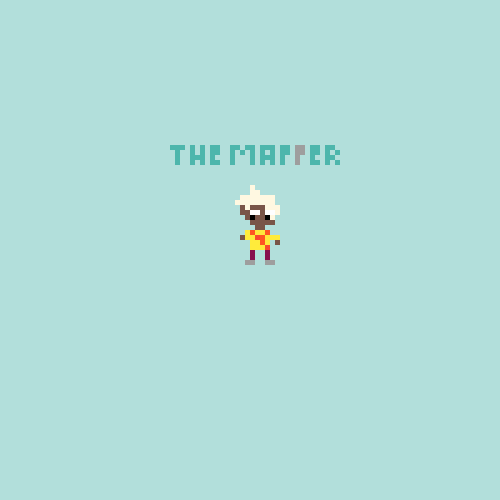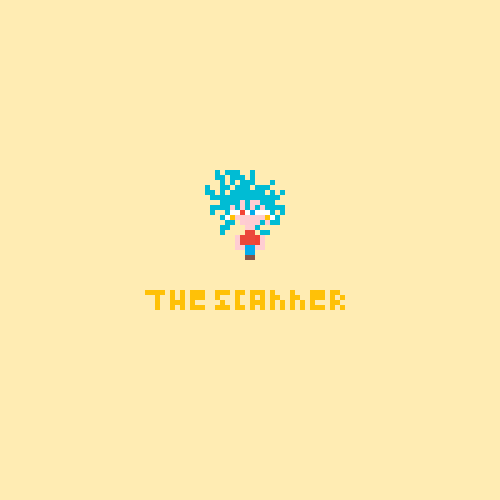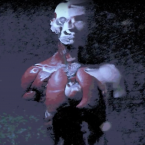The first and arguably only test of a piece of art starts with the question: For what was it made?
Demented Squirrel was approached mid-March in talks to host a quarantine-specific digital festival celebrating arts and raising awareness for digital rights, now hailed the digiArts fest 2020, with a call for submissions until 25th April, in aid of relieving art-based boredom and tackling the very current issue of the state of our affairs in cyberspace at the moment that we realise that we can exist purely online and might not even need to go back outside. (Something us long-time bloggers might have known before it was tragic and fatal.)
To announce the festival, to alleviate inactivity, and to give a taste of the magic here existing in the digital realm, I interviewed the pixel team bringing you the digiArts fest from quarantine, vogue-style.
The whir of my laptop failing to connect to an FTP server to access and modify precious dot files became the setting of something worthy of the next extravagant sci-fi film. I met the rumoured members of Demented Squirrel’s back team, who first appeared within the reboot log as long white strings of light, the way you imagine spiders spinning silk.
It is a pixel’s choice to whether they reveal themselves or not. They are melodramatic characters, who take on as vainer personality as any human, myself included. with their own motivations, and any number of super heroic qualities. Having been coding nearly all of my life, at first I lamented at never having had them appear to me, but this fortuitous day brought me closer than ever sought after to this pixel team and to hosting a digiArts festival which mattered to us all.

The Mapper is overtly, try-hard cool, someone who I would assume diverts attention at social events because they can’t handle being overshadowed, but it’s warranted. He’s devoted his life to Tech pursuits and is building influence in San Francisco circuits. At the time of our interview, he’s wearing a bright red Chiffon scarf, his ‘signature unit if not for my shoes’, he later remarks. His hair was strikingly white, but his voice felt like it had lost strength some time ago. The three of them, each with a different role in the fest, look quite awkward together; I almost felt bad I hadn’t asked them all on the screen separately.
Q: For what was it made? From where did it come?
A: The server’s here are never doing better. We have the iCloud guys, they’ve hit big money. Big money. There’s so much work to be had in the universal market. We were just a small operation in a US hosting facility, and suddenly the company numbers are jolting. But I thought to myself, how is all this going to impact them? The humans. We’ve got bits handling data, sorting, distributing, selling, buying- and they’re not really considering where all this is coming from, or using reasonable control over this data transfer. In what way can we, as a pixel base, give back to and protect the tools – the humans – that provide us?
Q: So you arranged a Digital Arts festival for humans?
A: Exactly, yeah. Between the three of us, we’ve got all the labour we need. And there’s all these great ways humans can create things- ways that we can’t quite understand. If they submit to this festival, we can do all the footwork and make sure their art gets seen. It’s not about being commercial at all, it’s about art. And the wider issue is that humans get to think about how our world operates, under the screen. What that means for them in terms of privacy and who gets to sell what.
Q: Is there a particular digital issue that’s been on your mind through all this?
A: It’s a mix of everything- and it’s more about the timing and what’s afoot in the real world. We have the luxury of a booming economy with more bits being created by the nanosecond. You’re dying and we’re profiting. We’ve seen an increase in surveillance and it could seem reasonable given that people want to get better, but it’s going to last beyond this virus, because after all this, where do you think these new pixel characters are going to go? They’re not – they’re here to stay. And that’s going to affect your rights. You have to make sure what you’re doing is proportionate to the problem it’s trying to solve.
// ( New York’s STOP has a list of surveillance-COVID19 related articles on their site.)
It’s not about being commercial at all, it’s about art. And the wider issue is that humans get to think about how our world operates, under the screen.

In contrast, The Bell Girl remarks on me as slow to open, but furious when she does. Her name alone suggests she collects luggage in absolute normality, and I’d be inclined to believe it apart from that she radiates more genuine authority than her two co-workers combined. I imagine in that sense, the sound of a persistent and telling bell might come into more significance down her career line.
Q: Do you think art can make a difference?
A: We live in a world where if you have money, you can be the president and change the way things operate. It’s our duty to keep the voices of everyone, however small or marginalised, heard. If the last remaining freedom of the internet to output that voice is censored; if surveillance reaches a point where it can be used wrongfully or without transparency; then we have already lost. Whether art is powerful or not is not the question. Censorship is powerful. It keeps leaders unquestioned, people in the dark, and and the media, binary. We pixels know above all others, binary isn’t detailed enough for the real world.
Q: What type of art would you like the festival to showcase?
A: In reality, any type or genre, as long as it means something to the artist. We like digital art in the traditional sense like pixels, graphics, motion, animation, game dev. But it can also be internet poetry, alt-lit, text or ASCII art, typography, photography, video, etc. It’s open, like the internet should be. And the team is always amazed by the creativity of humans.
Whether art is powerful or not is not the question. Censorship is powerful.

The Scanner is giving off sparks from my screen as we finish the interview; I can feel the ends of my hair rising like quantum levitation in their field. It will never quite be the blue beauty and Medusa-esque power of The Scanner’s; a small jealousy overcomes me. The shiest of the three, the second-born, and the last to reveal itself. They always rock a pair of paper-thin 3D glasses and though they speak little, there is always a faint sizzling sound as light is given off. The others comment that The Scanner is the light in a dark room; I get that very impression favourably. My questions for them tail off quickly upon realising I may be treading harshly on their introversion.
Q: What is the big problem with new companies like Zoom? How can we stay private and still be connected?
A: It’s virtually impossible to keep away from privacy violations unless we constantly ask questions and hold companies to account. Zoom is a company that is currently in trouble for being insecure, and susceptible to hackers and government requests, after its numbers increased immensely rapidly, hence it’s claiming to be updating its software to address some of these concerns (the guardian’s article.). Electronic Frontier Foundation, a US digital rights organisation, posted some guidance on how to remain as private as possible on Zoom. It’s somewhat convenient that bigger more established profitable companies like Microsoft have used this news storm to drum up their own softwares.
Q: Are there any other helpful sites which you have scanned for that we should check out?
A: The pixel team don’t have any associations with any organisation, but we watch for digital rights news and activity, especially through organisations working on issues real-time. I would recommend Open Rights Group for the UK, Electronic Frontier Foundation in the US, and Privacy International, Index on Censorship and Article 19 internationally, who all post blogs and updates at least weekly on their work in digital rights.
It’s open, like the internet should be.



[…] The artists in order of appearance are: Diana Rogagels (video still featured in image above), Aurelie Crisetig, Daniel Bryden. Robert Jarvis and Thomas Valianatos. Each, a different medium to the last, with varying themes, and you are encouraged to take some thinking time over the exhibitions on “for what they were made“. […]